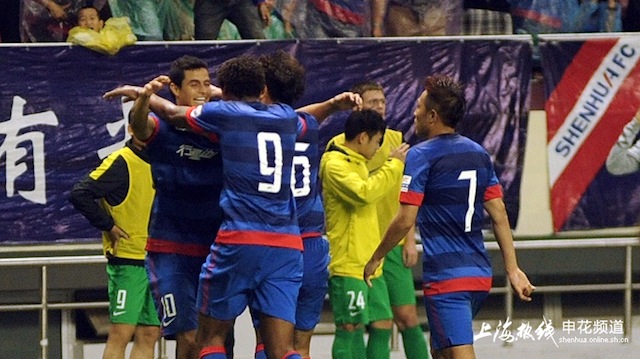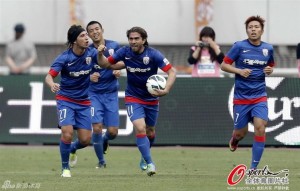With the season just over the half-way point, it’s time to look at CSL’s soap opera club Shanghai Shenhua and the surprising season the Hongkou side have had so far. Despite being shorn of world-class talent in the shape of Didier Drogba and Nicolas Anelka, the club find themselves making much more progress on the pitch than last season. ‘s man in Shanghai, Cameron Wilson, gives his analysis.
It’s difficult to over-state just how much of a mess Shanghai Shenhua were in at the start of this year. The club was in the midst of a civil war, and its credibility at home and abroad took a serious blow due to its inability to pay the massive salaries of Drogba & Anelka, and the shareholder dispute behind this rumble on without conclusion and continue to cast a cloud over the club’s future. Other departures further left the squad looking threadbare, Chinese national team players Wu Xi and Feng Renliang joined Jiangsu Sainty and Guangzhou Evergrande respectively. Long-standing captain Yu Tao sensationally joined local rivals Shanghai Shenxin.
With the departures of the EPL superstars, and key domestic players, Shenhua desperately needed new blood of some kind. It came strictly from the bottom of the barrel as Shenhua’s transfer policy went from the sublime to the ridiculous. Fans gasped when they learned of the new recruits for this season. Out had gone Anelka and Drogba, in came two strikers no-one had ever heard of – a Syrian and a Cape Verdean. At the back, things were even worse – a 40-year-old Argentinian defender was unveiled, and another journeyman Argentinian midfielder signed up. Domestic signings were even poorer – two 31-year-old Beijing Guoan midfielders, a young defender who couldn’t get a game for Guangzhou Evergrande, and a winger from Shanghai East Asia. The only bright sign was the signing of Bai Jiazhun, also from East Asia. After years without a proper left-back, Zhu Jun realised he had to do something made Bai’s loan deal permanent.
If things already looked bad on the personnel front going into the season, they got a whole lot worse when Shenhua were hit with a -6 point penalty for match-fixing 10 years ago. Regardless of the timing of the punishment, it was a serious blow for a club already on a downwards trajectory. Many commentators, including some correspondents predicted relegation for Shenhua, and even the most ardent Shenhua fans had to concede that the club faced a very tough year at best. The club had a mountain to climb it seemed, and a lot of things which normally go wrong at Shenhua would have to go right this year if they were to meet their stated aim of avoiding relegation.
But despite all the doom and gloom, the first few games saw Shenhua pick up more points than expected. As hoped by many in blue, Sergio Batista had managed to engender a siege mentality, as the team pulled together to become far more than the sum of their parts. The opening few games saw Shenhua come away with one win and two draws. The most significant coming at the end of March when the team came from two goals down to draw against Liaoning. But if Shenhua had started the season with a -6 handicap, the ongoing shareholder dispute saw the club handicap itself further in this game – Shenhua’s South American contingent all refused to play due to non-payment of wages.
One man who did play despite not being paid was Firas Al-khatib. Not much was known about him before he arrived, except he was a Syrian international who had been playing in the Iraqi league of all places, and had scored against China a few years back. Hardly a glowing curriculum vitae. But coming from a country in the midst of a bloody civil war, it was clear Al-khatib had a hunger to play football somewhere more attractive than Iraq or Syria, and despite being ruled by a madman, Shenhua and the allure of an international metropolis must have been a pull for Firas. On the pitch, he was pint-sized, but an extremely effective team player, never wasting a ball, never shooting when a team-mate had a certain scoring chance instead. What he lacked in strength and height, he made up for with close control, balance and general movement. Shenhua scored five goals in their first five games this season – Firas scored three and set-up the other two.
Two of these three goals game in a classic smash-and-grab victory against then championship challengers Shandong Luneng. It was a game which gave Shenhua the title “comeback Kings” – and this would be the hallmark of the first half of Shenhua’s 2013 season. Liaoning, Shandong, Shanghai East Asia, Qingdao and Wuhan would all fall to late goals which turned Shenhua defeats into draws, and draws into victories. The Wuhan game in particular was a memorable one Shenhua drawing 3-3 after Wuhan had raced into a three goal lead. These late goals were the product of a team playing as a unit in a way seldom seen before at Hongkou Football Stadium, and the sign of a team playing with spirit – “Shenhua Jingshen” the Shanghai media called it. Far from looking down and out, Shenhua finished the first half of the season 7 points clear of second-bottom Tianjin – a team which also started the season on -6 points for misdemeanours in the past. Shorn of Anelka and Drogba unbalancing the team with their supreme excellence and general higher standard, (well, in Drogba’s case at least), the team became a team again, and a very tough one at that.
So how have the bargain basement budget version of Shenhua done this year? On paper, exactly the same as last year, but, taking into account the six point deduction, despite spending a fraction of what they did last year, Shenhua’s achievement is significantly better so far this year.
Shenhua 2012 mid season – W3 D6 L6 F8 A13 Pts 15
Shenhua 2013 mid season – W4 D9 L2 F17 A17 Pts 21 (-6 points deduction means the CSL total is 15)
 Quite an eye-opening contrast. Where have the extra goals and points came from this season then? Aside from the excellent Firas Al-khatib, Shenhua owe a lot to deep-lying playmaker Xu Liang. was a little sceptical of this 31-year-old when he joined, but despite an indifferent start, he quickly became the team’s key player, alongside Firas. His passing, control and calm head have linked the entire team together. Other significant performances include Rolando Schiavi, whose performances belie his 40 years to the point where Shanghai’s bakeries are fresh out of humble pies. Obviously not the fastest or most agile at 40, his experience means he’s way ahead of the game and his positioning is faultless.
Quite an eye-opening contrast. Where have the extra goals and points came from this season then? Aside from the excellent Firas Al-khatib, Shenhua owe a lot to deep-lying playmaker Xu Liang. was a little sceptical of this 31-year-old when he joined, but despite an indifferent start, he quickly became the team’s key player, alongside Firas. His passing, control and calm head have linked the entire team together. Other significant performances include Rolando Schiavi, whose performances belie his 40 years to the point where Shanghai’s bakeries are fresh out of humble pies. Obviously not the fastest or most agile at 40, his experience means he’s way ahead of the game and his positioning is faultless.
Once again this season, Shenhua owe a huge debt of gratitude to Wang Dalei. His performances this season have been nothing short of stunning, in particular games against Shandong and Dalian Aerbin saw the 24-year-old single-handedly keep his side in the game. His elevation to the national team is much deserved and must be a serious candidate for becoming China’s regular number one alongside Zeng Cheng of Evergrande and Guoan’s Yang Zhi.
Another of this season’s success stories has been Song Boxuan. The man who arrived in 2010 from 3rd division Tianjin Locomotive with Feng Renliang has come to the fore, perhaps because he is no longer in the shadow of Feng who is now in Guangzhou. A more natural winger than Feng, his crossing and speed are an asset to Shenhua, its a real pity he wasn’t used this way last season when Drogba was in the box waiting to head the ball home. Nevertheless, he’s surely Shenhua’s most improved player this season and whilst he is prone to the odd off-game, this is the lot of the winger, especially in modern football.
Elsewhere Wang Shouting has been fairly solid playing alongside Xu Liang infront of the back four, and Bai Jiajun has put in his expected effort and tenaciousness at left back. We also can’t discount the contribution of Dady upfront. He may have the touch of a rapist, but he’s been in the right place at the right time to score six goals so far. That is three more than Anelka did all last season, and five more than hopeless donkey Matthieu Mansett had managed because he was humanely shifted back to Reading FC. Finally, Wang Changqing, a man who had barely played for Beijiing in recent seaons before joining Shenhua this season, has surprised many with his work ethic and willingness to play in unfamiliar positions.
For the rest of the squad, despite the relatively impressive start to the season, question marks hang over many individuals. Cao Yunding, after being heavily tipped by to become a Shenhua great, has had a very indifferent season, going from first choice midfielder back to his old station on the bench after a couple of months. He’s said to have personal issues this year, but whatever they are, Shenhua needs him to sort them out quick smart. At the back Li Jianbin, on loan from Evergrande, looked shaky and lightweight earlier this season, and made several crucial mistakes. By the end of the first half of the year, he did appear to be finding his feet and put in a man-of-the-match performance against Dalian Aerbin. Despite this, he is unproven.
The right-back position is also an issue. After having signed Bai Jiajun to solve Shenhua’s seasons-old no-proper-leftback problem, the club now have no proper right-back after failing to replace Wu Xi. Wang Changqing has done as well as could be expected when drafted in, but Dai Lin, previously the side’s best domestic defender, is as much a right-back as he is an international diplomat. His play has been erratic and he looks lost out of position. He also appears to have forgotten how to play centre back in the few games he’s played there.
In midfield, Jiang Kun is still puffing away, he just about does enough to merit not selecting someone from Shenhua’ shaky reserves to play inside. But the key man here was Gio Moreno who left the club a few weeks ago. The most naturally gifted player at Hongkou, he was also the laziest and most wasteful with the ball. Despite setting the heather on fire when he first arrived, he became a complacent showboater who messed up the entire rhythm of the team. His departure is a blessing in disguise in the eyes of your correspondent, generally speaking. His choice of next destination, Dubai, speaks volumes about his attitude.
So, Shenhua are playing like a team again and did much better this season so far compared to last. If this review had been written a couple of weeks back, predictions would have been optimistic of a top-half finish. However, it wouldn’t be Shenhua if they didn’t make it harder for themselves, the sudden departure of Sergio Batista can only be considered a significant blow – the Argentinian had won the fans and your correspondent over by leading Shenhua to a very impressive first half of 2013. The last thing replacement coach, Shen Xiangfu, did before joining Shenhua was get Henan Jianye relegated, he has long experience in the Chinese game but he has his work cut out to keep Shenhua on the right path in the second half of the season.
The playing staff are also badly compromised. Key man Xu Liang is out for 3-4 months with a cruciate knee ligament injury which is a major blow considering the lack of strength and depth in the squad. His right-hand man in midfield, Wang Shouting, is suspended for five games – an absolutely absurd punishment for pulling play-acting Matt McKay of Changchun off the pitch during a recent clash. Gio Moreno is no more, but despite his lack of team awareness, he did score some goals and create some chances and his departure is rather untimely. This is why Cao Yunding needs to step up his game – Argentinian Patrico Toranzo lacks bite and energy in the middle and his contribution so far has not been great. Jiang Kun, as we have said many times before, is way past it and he cannot be relied on.
Shenhua may move for someone in the summer transfer window to replace Gio Moreno, as things stand this would seem to be Shenhua’s best hope of keeping momentum and avoiding relegation. Because, as the reserve team proved in that absolutely dreadful defeat to 3rd division Dali, Shenhua have a shocking lack of strength and depth in the squad. Shenhua still have a lot of work to do to achieve their goal of staying in the CSL in 2013 and with key players missing and a new coach, the margin for error is even smaller than it was before.



